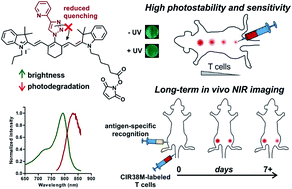Tricarbocyanine N-triazoles: the scaffold-of-choice for long-term near-infrared imaging of immune cells in vivo†
Abstract
Herein tricarbocyanine N-triazoles are first described as a rationally-designed near-infrared (NIR) structure overcoming the brightness and photostability limitations of tricarbocyanines for long-term in vivo imaging. The straightforward synthetic approach and the wide availability of alkynes makes this strategy a versatile methodology for the preparation of highly stable N-substituted tricarbocyanines. Furthermore, we validated CIR38M as a non-transferable marker to monitor the fate of therapeutic T cells non-invasively in vivo, showing enhanced performance over conventional NIR fluorophores (i.e.DiR, IR800CW and indocyanine green) as well as compatibility with human cells for translational studies. CIR38M is able to track over time smaller numbers of T cells than current NIR agents, and to visualise antigen-driven accumulation of immune cells at specific sites in vivo. This chemical technology will improve longitudinal imaging studies to assess the efficacy of cell-based immunotherapies in preclinical models and in human samples.

- This article is part of the themed collection: Near-infrared (NIR) luminescent probes for bioimaging and biosensing


 Please wait while we load your content...
Please wait while we load your content...